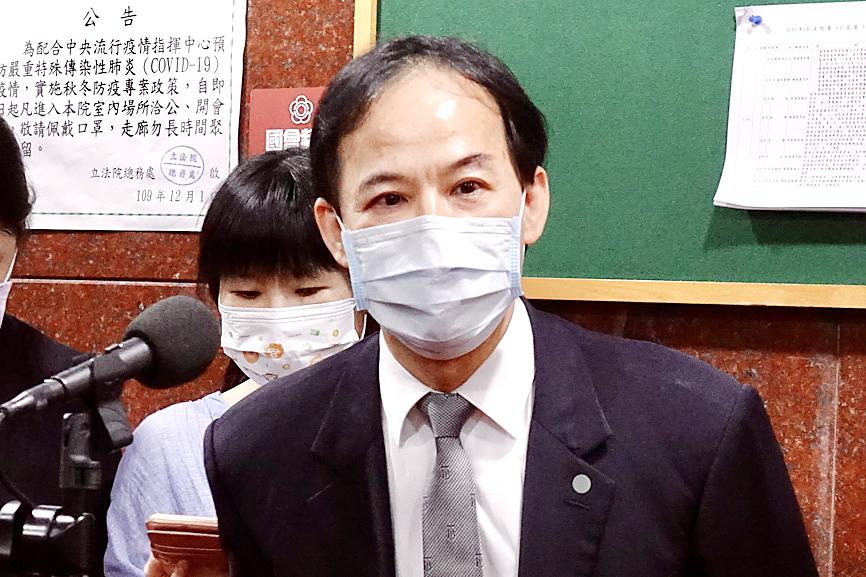The Financial Supervisory Commission (FSC) is to tighten its review of listed companies’ capital reduction plans after dozens of firms announced reductions in the first quarter, the commission said yesterday.
The commission requires certified public accountants to justify the necessity of a capital reduction and its effects on a company’s financial structure if it plans to cut capital by more than 50 percent.
Given a rise in the number of local companies that have applied to reduce capital, the commission has asked the Securities and Futures Investors Protection Center to help review the plans on a case-by-case basis, Securities and Futures Bureau Director-General Sam Chang (張振山) told a meeting of the legislature’s Finance Committee in Taipei yesterday.

Photo: Tu Chien-jung, Taipei Times
The FSC expects to announce the results of its review in two weeks, Chang said.
The change comes after Chinese Nationalist Party (KMT) Legislator Alex Fai (費鴻泰) asked the commission whether it was suspicious that more companies announced capital reductions in the first quarter.
Eighteen listed firms announced capital reductions totaling NT$57.48 billion (US$1.98 billion) as of the end of last month, nearly as high as for the whole of 2018, Fai said.
Unlike companies’ previous capital reductions, which mostly correlated with rising share prices, the announcements in the first quarter constrained share prices, as in most cases the companies’ share prices fell the next day, Fai added.
Rumors had circulated that some companies aimed to reduce capital to dilute stakes held by minor shareholders, a move that would help certain players gain boardroom control, he said.
Such moves could be possible, and the commission would keep a lookout for this behavior in its review, Chang said.
A capital reduction is just one tool that companies can use to adjust their capital structure, and does not necessarily mean anything more, Chang said, adding that whether such an announcement results in a company’s share price rising or falling depends on how investors interpret the move.
The commission bars companies from conducting capital injections for one year following a capital reduction, Chang said.
Some lawmakers had recommended that the FSC should lengthen the period to three years, but it might be inappropriate as corporate management requires flexibility, Chang said.

South Korea’s equity benchmark yesterday crossed a new milestone just a month after surpassing the once-unthinkable 5,000 mark as surging global memory demand powers the country’s biggest chipmakers. The KOSPI advanced as much as 2.6 percent to a record 6,123, with Samsung Electronics Co and SK Hynix Inc each gaining more than 2 percent. With the benchmark now up 45 percent this year, South Korea’s stock market capitalization has also moved past France’s, following last month’s overtaking of Germany’s. Long overlooked by foreign funds, despite being undervalued, South Korean stocks have now emerged as clear winners in the global market. The so-called “artificial intelligence

NEW IDENTITY: Known for its software, India has expanded into hardware, with its semiconductor industry growing from US$38bn in 2023 to US$45bn to US$50bn India on Saturday inaugurated its first semiconductor assembly and test facility, a milestone in the government’s push to reduce dependence on foreign chipmakers and stake a claim in a sector dominated by China. Indian Prime Minister Narendra Modi opened US firm Micron Technology Inc’s semiconductor assembly, test and packaging unit in his home state of Gujarat, hailing the “dawn of a new era” for India’s technology ambitions. “When young Indians look back in the future, they will see this decade as the turning point in our tech future,” Modi told the event, which was broadcast on his YouTube channel. The plant would convert

‘SEISMIC SHIFT’: The researcher forecast there would be about 1.1 billion mobile shipments this year, down from 1.26 billion the prior year and erasing years of gains The global smartphone market is expected to contract 12.9 percent this year due to the unprecedented memorychip shortage, marking “a crisis like no other,” researcher International Data Corp (IDC) said. The new forecast, a dramatic revision down from earlier estimates, gives the latest accounting of the ongoing memory crunch that is affecting every corner of the electronics industry. The demand for advanced memory to power artificial intelligence (AI) tasks has drained global supply until well into next year and jeopardizes the business model of many smartphone makers. IDC forecast about 1.1 billion mobile shipments this year, down from 1.26 billion the prior

People stand in a Pokemon store in Tokyo on Thursday. One of the world highest-grossing franchises is celebrated its 30th anniversary yesterday.